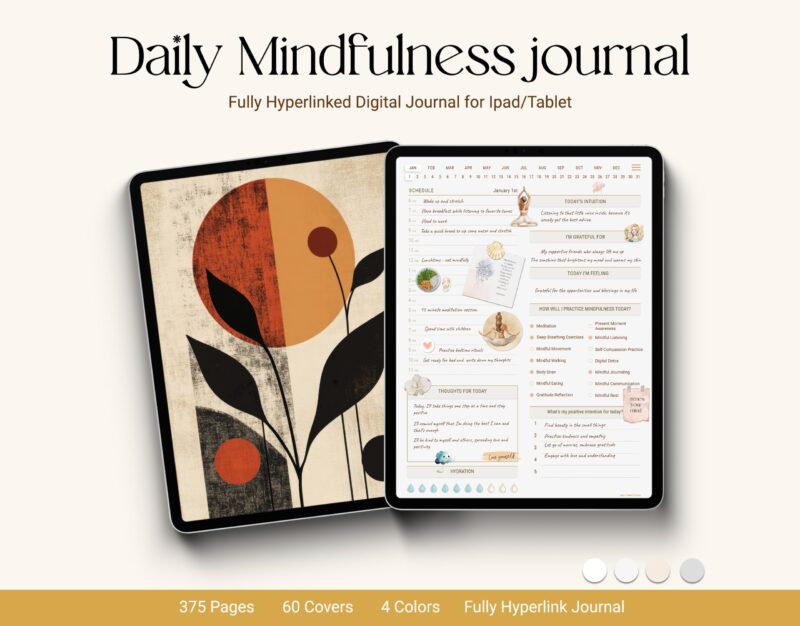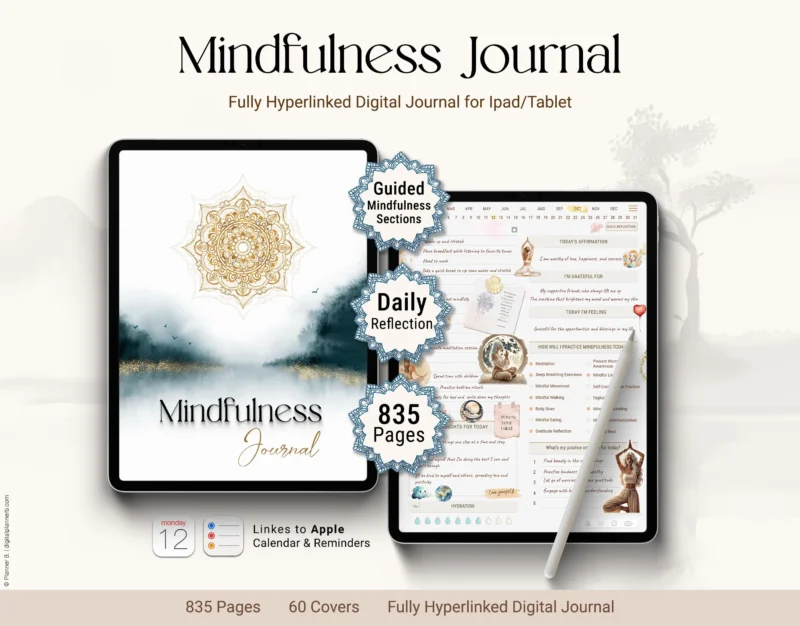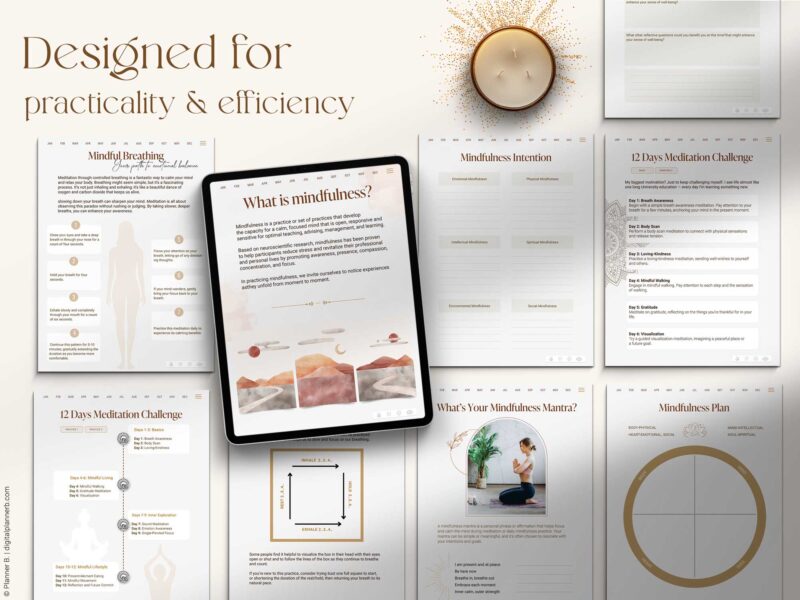Blog
Discover the 4 Mindfulness Foundations That Will Transform Your Life!

In these times, many struggle to find moments of calm and clarity. But what if there's a way to cultivate inner peace and tap into the power of the present moment? This quest has become increasingly prominent in people's lives in recent years, leading many to turn to mindfulness for answers. Mindfulness, a practice that has gained immense popularity for its ability to transform lives, offers a path to achieving that sought-after sense of peace and clarity.
In this article on planner B, we will delve into the art of mindfulness and unveil the 4 essential building blocks that will help you master this transformative practice. From understanding the power of breath to cultivating self-awareness, these building blocks will lay the foundation for a more conscious and connected way of living.
Whether you're new to mindfulness or looking to deepen your practice, this article will provide you with the tools and insights you need to embrace this powerful technique. Through the exploration of these building blocks, you will learn how to navigate the challenges of daily life with grace and resilience, while tapping into a profound sense of inner peace, a practice that has the potential to change your life in extraordinary ways.
Understanding Mindfulness
Mindfulness is the practice of bringing one's attention to the present moment with an attitude of openness and non-judgment. It involves paying deliberate attention to one's thoughts, feelings, and sensations, without getting caught up in them or reacting to them. By cultivating this state of awareness, we can develop a deeper understanding of ourselves and the world around us.
At its core, mindfulness is about being fully present in the here and now. It encourages us to let go of regrets about the past and worries about the future, and instead, focus on the present moment. This can be done through various techniques such as meditation, breathwork, and body scan exercises.
Practicing mindfulness allows us to observe our thoughts and emotions without judgment, creating a space for self-reflection and self-compassion. It helps us break free from the cycle of constant mind chatter and automatic reactions, enabling us to respond to life's challenges with clarity and equanimity.
Benefits of Practicing Mindfulness
The practice of mindfulness offers numerous benefits for our mental, emotional, and physical well-being. Research has shown that regular mindfulness practice can reduce stress, anxiety, and depression, while increasing overall happiness and life satisfaction. It has also been found to improve focus, memory, and cognitive abilities.
One of the key benefits of mindfulness is its ability to cultivate resilience and emotional intelligence. By developing a greater awareness of our thoughts and emotions, we can better understand and regulate our reactions to difficult situations. This allows us to navigate challenges with greater ease and bounce back from setbacks more quickly.
Moreover, mindfulness has been found to enhance our relationships and social connections. When we are fully present and attentive, we can communicate more effectively, empathize with others, and build deeper connections. This not only improves our personal relationships but also fosters a sense of belonging and community.
Digital Daily Journal
Daily Mindfulness Journal
Digital Mindfulness Journal
The Science Behind Mindfulness
Over the past few decades, neuroscience has shed light on the mechanisms behind the transformative effects of mindfulness. Studies have shown that regular mindfulness practice can lead to structural and functional changes in the brain, particularly in areas associated with attention, emotion regulation, and self-awareness.
Mindfulness practice has been found to increase the thickness of the prefrontal cortex, a region responsible for executive functions such as decision-making and self-control. It also strengthens the connections between the prefrontal cortex and the amygdala, the brain's emotional center, leading to better emotional regulation.
Additionally, mindfulness practice has been shown to activate the default mode network, a network of brain regions involved in self-referential thinking and mind-wandering. By becoming aware of our thoughts and redirecting our attention to the present moment, we can reduce rumination and increase cognitive flexibility.
These neuroscientific findings provide empirical evidence for the effectiveness of mindfulness in promoting well-being and personal growth. They demonstrate that mindfulness is not just a subjective experience but has tangible effects on the structure and function of the brain.
The Four Essential Building Blocks of Mindfulness
To master the art of mindfulness, it is essential to cultivate four key building blocks that form the foundation of this transformative practice. These building blocks are attention and awareness, non-judgmental acceptance, compassion and kindness, and living in the present moment. Let's explore each of them in detail.
Building Block 1: Attention and Awareness
The first building block of mindfulness is developing attention and awareness. This involves training the mind to focus on the present moment and be fully aware of our thoughts, emotions, and sensations. By bringing our attention to the present moment, we can cultivate a sense of presence and mindfulness in our daily lives.
One of the most effective ways to develop attention and awareness is through the practice of meditation. Meditation involves sitting in a comfortable position, closing our eyes, and directing our attention to a specific anchor, such as the breath or a mantra. When our mind wanders, as it inevitably will, we gently bring our attention back to the anchor without judgment.
As we continue to practice meditation, we become more skilled at noticing when our mind has wandered and bringing it back to the present moment. This strengthens our attention muscle and enhances our ability to stay focused and present in our everyday activities. With time, we can bring this heightened awareness to all aspects of our lives, leading to a more mindful and meaningful existence.
Building Block 2: Non-judgmental Acceptance
The second building block of mindfulness is cultivating non-judgmental acceptance. This involves observing our thoughts, emotions, and sensations without labeling them as good or bad, right or wrong. It is about accepting whatever arises in our experience with an attitude of curiosity, openness, and kindness.
Often, we tend to judge ourselves and our experiences, which can lead to unnecessary suffering and self-criticism. By practicing non-judgmental acceptance, we can develop a compassionate and non-reactive stance towards ourselves and others. We learn to acknowledge our thoughts and emotions without getting entangled in them or trying to change them.
To cultivate non-judgmental acceptance, it is important to cultivate self-compassion and self-kindness. This involves treating ourselves with the same care and understanding that we would offer to a dear friend. By practicing self-compassion, we can embrace our imperfections and vulnerabilities, and cultivate a sense of unconditional acceptance and love for ourselves.
Building Block 3: Compassion and Kindness
The third building block of mindfulness is cultivating compassion and kindness towards ourselves and others. Compassion involves recognizing and empathizing with the suffering of others, while kindness involves actively seeking to alleviate that suffering. By cultivating these qualities, we can foster a deeper connection with ourselves and promote well-being in others.
One of the most powerful ways to cultivate compassion and kindness is through loving-kindness meditation. This practice involves directing well-wishes towards ourselves and others, including loved ones, neutral people, and even difficult individuals. By cultivating feelings of love, kindness, and goodwill, we can develop a more compassionate and inclusive mindset.
Practicing compassion and kindness not only benefits others but also enhances our own well-being. Research has shown that acts of kindness increase happiness, reduce stress, and improve overall mental health. By being kind to ourselves and others, we create a positive ripple effect that can transform our lives and the lives of those around us.
Building Block 4: Living in the Present Moment

The fourth building block of mindfulness is living in the present moment. This involves fully embracing the here and now, without getting caught up in regrets about the past or worries about the future. It is about savoring each moment and finding joy and gratitude in the simple pleasures of life.
Living in the present moment requires us to cultivate a sense of mindfulness in our daily activities. Whether we are eating, walking, or engaging in conversation, we can bring our full attention and presence to the task at hand. This allows us to fully engage with the experience and derive greater satisfaction and fulfillment from it.
To cultivate living in the present moment, it can be helpful to incorporate mindfulness into our daily routines. We can practice mindful eating by savoring each bite, paying attention to the flavors and textures of our food. We can practice mindful walking by bringing our awareness to the sensations in our feet and the movement of our body. By infusing mindfulness into our daily lives, we can transform ordinary moments into extraordinary ones.
Incorporating Mindfulness into Your Daily Life
Now that we have explored the four essential building blocks of mindfulness, it's time to incorporate this practice into our daily lives. Here are some practical tips to help you embrace mindfulness and experience its transformative power:
1- Start with small moments of mindfulness: Begin by setting aside a few minutes each day for formal mindfulness practice, such as meditation or breathwork. As you become more comfortable, gradually expand these moments of mindfulness to other activities throughout the day, such as washing dishes or brushing your teeth.
2- Create reminders: Set reminders or cues throughout your day to bring you back to the present moment. This could be a gentle alarm on your phone, a sticky note on your desk, or a symbol or object that serves as a reminder to pause and center yourself.
3- Practice gratitude: Cultivate a daily gratitude practice by reflecting on three things you are grateful for each day. This helps shift your focus from what is lacking to what is present, fostering a sense of contentment and appreciation.
4- Be kind to yourself: Treat yourself with kindness and compassion, especially during moments of difficulty or self-criticism. Practice self-care activities that nourish your mind, body, and soul, such as taking a bath, going for a walk in nature, or engaging in a hobby you enjoy.
5- Seek support: Consider joining a mindfulness group or attending a mindfulness retreat to deepen your practice and connect with like-minded individuals. Surrounding yourself with a supportive community can provide encouragement and accountability on your mindfulness journey.
6- Embrace mindfulness journaling: Start a mindfulness journal to track your thoughts, emotions, and experiences. Use your mindfulness journal as a tool for self-reflection and growth, noting patterns in your behavior and exploring how mindfulness impacts your daily life. By regularly journaling, you can deepen your understanding of mindfulness and cultivate a greater sense of awareness and presence in your life.
Remember, mindfulness is a lifelong practice, and it's okay to have moments of forgetfulness or distraction. The key is to approach each moment with a gentle curiosity and a willingness to begin again. If you want to explore more about mindfulness journaling, consider checking out our mindfulness journal for guided prompts and exercises to enhance your practice.
Conclusion: Embracing Mindfulness for a More Fulfilling Life
In conclusion, mindfulness is a powerful practice that can transform our lives in extraordinary ways. By cultivating attention and awareness, non-judgmental acceptance, compassion and kindness, and living in the present moment, we can tap into a deep well of inner peace and resilience.
Through the practice of mindfulness, we can navigate the challenges of daily life with grace and equanimity, while fostering deeper connections with ourselves and others. It is a journey of self-discovery and self-compassion that has the potential to unlock our true potential and lead to a more fulfilling and meaningful life.
So, take a moment to pause, take a deep breath, and step into the present moment. Embrace the art of mindfulness and embark on a transformative journey towards greater well-being, joy, and inner peace.







